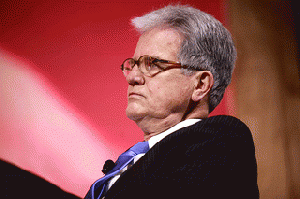Reprinted from Reader Supported News
Every day, 22 veterans commit suicide. Just recently, suicide became the leading cause of death for military personnel, outdoing even war itself. If the suicide prevention bill is passed when Congress reconvenes on January 3, it will have been 18 days from the date of Coburn's filibuster. And that means almost 400 veteran suicides might have been prevented if a lame duck senator hadn't needlessly stood in the way.
The alleged reason for Coburn's filibuster of veteran suicide prevention was the cost -- $22 million. He also shifted blame to the Department of Veterans Affairs, saying the bill wouldn't do anything to make up for the VA's lack of services to veterans in need. But both of those arguments fall flat on their face. The $22 million cost of the bill pales in comparison to the $770 billion cost of the Afghanistan war, or the $818 billion cost of the Iraq war, both of which Coburn repeatedly voted for. Both of those wars are costing the American people $10.5 million every hour, yet Coburn is making noise about a price tag that amounts to two hours of war in Iraq and Afghanistan.
Coburn's feigned concern over the lack of services the VA provides is also flimsy at first glance. In 2011, Coburn voted for Paul Ryan's House Republican budget that would have ended VA care for 1.3 million veterans. Year after year of consistent budget cuts to the VA naturally results in delayed services for veterans and a longer backlog of veterans who wait months and even years for their care. If Coburn is looking for a reason why the VA can't provide enough services, he should look in the mirror.
This bill, named after Clay Hunt -- an Afghanistan veteran who committed suicide in 2011 -- would have made a difference in the lives of military personnel switching from active duty to veteran status by providing them with services to ease the transition. It would have set up a user-friendly website to help direct veterans to mental healthcare services, given psychiatrists financial incentives to provide mental healthcare to veterans, and funded independent reviews at the Pentagon and the VA for suicide prevention. The bill passed the House with bipartisan support, and had the support to pass the Senate had it not been for Coburn's actions.
Coburn's blocking of the bill has made him a target of rage on social media. After a meme explaining Coburn's vote went viral on Facebook, the outgoing senator's Facebook page lit up with hundreds of comments on all of his recent posts urging him to kill himself, among other things. Angry tweets directed to @TomCoburn said they hoped he had no help available when he decided to commit suicide. After a brief reading of comment threads in recent posts, I wasn't able to find one comment in support of Coburn's vote to block veteran suicide prevention.
As Paul Rieckhoff, CEO of Iraq and Afghanistan Veterans of America, said: this is why people hate Washington. The suicide prevention bill must be passed as soon as the next Congress convenes, so the ramblings of one bitter, out-of-touch senator won't have any further impact on veterans who legitimately need help holding on.





